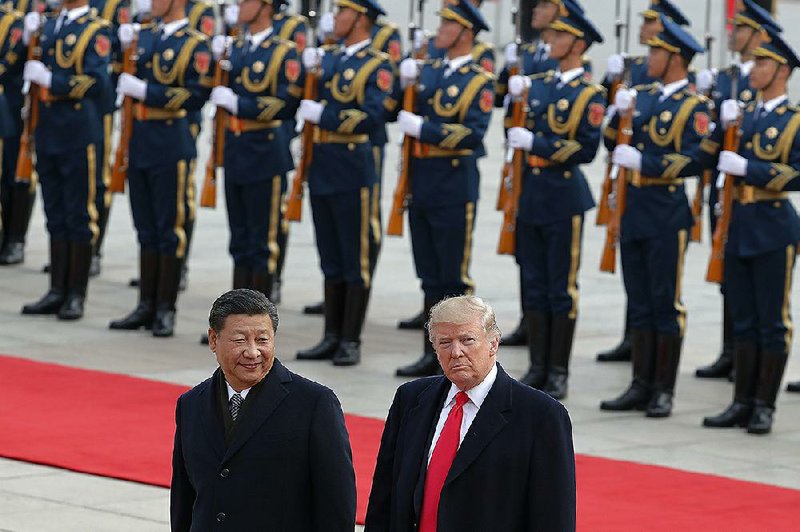WASHINGTON -- President Donald Trump and Chinese President Xi Jinping will meet in Buenos Aires, Argentina, later this week to confront perhaps the greatest threat to the weakening global economy -- each other.
For the first time since Trump began raising tariffs on Chinese products in July, there is cautious optimism that the two leaders may reach at least a partial deal to defuse a trade conflict that is rattling investors and sapping economic activity around the world.
Trump and Xi are to meet during the Group of 20 summit on Friday and Saturday. Unless the two leaders can achieve a truce of sorts, their conflicts will likely escalate: On Jan. 1, the tariffs Trump has imposed on many Chinese goods are set to rise to 25 percent from 10 percent, and Beijing would likely retaliate.
Domestic political forces, including suddenly wobbly U.S. financial markets and hints of elite disquiet in China, are propelling the two presidents toward a truce.
"The momentum now favors a cease-fire with a more intense negotiating phase to come after that," said Michael Pillsbury, director of the Hudson Institute's center on Chinese strategy and an occasional administration adviser.
Any such deal would probably only interrupt rather than reverse a broader deterioration in the relationship between Washington and Beijing. The president's chief trade negotiator, Robert Lighthizer, said in a report last week that despite months of U.S. complaints and tariffs on roughly $250 billion in Chinese imports, China "has not fundamentally altered its unfair, unreasonable, and market-distorting practices," and both governments appear convinced they will prevail in any enduring confrontation.
The Trump-Xi meeting during the Group of 20 summit comes at a pivotal moment for the global economy, which is slowing as central banks and governments cut back on financial stimulus.
The Paris-based Organization for Economic Cooperation and Development has lowered its growth forecast twice since May as trade tensions have spawned growing investment uncertainty and threatened delicate supply chains.
Global growth is expected to dip to 3.5 percent in 2019 from 3.7 percent this year. Full implementation of all of Trump's threatened tariffs, along with Chinese retaliation, would cut global growth in 2020 to near its slowest pace since the global financial crisis while shaving about half a percentage point from the U.S. and Chinese rates, according to Laurence Boone, the organization's chief economist.
"A soft landing is always difficult to engineer," Boone said. "Within the current environment, it is especially challenging."
The presidents' highly anticipated meeting in Buenos Aires represents "the greatest near-term risk" to the economic outlook, economists at JPMorgan Chase Bank said last week.
Trump often says the United States will prosper with or without a new arrangement with China, while Chinese officials believe the United States will suffer more since it is coming off an economic and stock market peak, said Mei Xinyu, a researcher at a Chinese Ministry of Commerce think tank.
China already has begun adjusting to slowing growth and will wait out Trump, who is up for re-election in two years, rather than be "humiliated" by a foreign adversary, Mei said.
"China is falling out a second-story window and spraining its ankle; the U.S. is falling off the top of the World Trade Center," he said. "The effects for each country will be different, and I think China is better able to take suffering."
For much of the past year, Chinese leaders had not believed that the Trump administration was serious about confrontation, with officials including Vice President Wang Qishan telling foreign visitors that Trump might ease off after the midterms, said a former U.S. government official who met with Wang and asked for anonymity to discuss confidential discussions.
But a resigned pessimism has emerged in Beijing, where there is serious talk of a new cold war after U.S. Vice President Mike Pence's sweeping condemnation of China at the Hudson Institute in Washington in October.
Another fiery Pence address at an Asian summit last month in Papua New Guinea -- where he briefly met Xi -- reinforced Chinese concerns that Washington is demanding fundamental changes in China's economic model that Beijing regards as nonnegotiable.
The administration alleges -- and many trade experts agree -- that Beijing hacks into U.S. companies' networks to steal trade secrets and forces American and other foreign companies to hand over sensitive technology as the price of access to China's market.
Beijing disputes those allegations and asserts that Trump's sanctions are merely an effort to hinder an ambitious rival.
No one expects an accord that resolves all of the disputes in the U.S.-China relationship. In recent months, the United States has stepped up its complaints about a range of Chinese practices -- including a military buildup in the South China Sea and Beijing's treatment of Muslims in Xinjiang province -- that go well beyond trade.
The most likely deal would involve Trump holding off on further tariff increases in return for Xi lifting his retaliatory tariffs on American products such as soybeans and liquefied natural gas, according to several analysts.
There is precedent for Trump holding his fire. In July, after repeatedly threatening to impose tariffs on automobiles imported from the European Union, Trump met with European Commission President Jean-Claude Juncker and agreed to effectively pause as long as trade talks between the two entities continued.
Information for this article was contributed David J. Lynch, Gerry Shih and Luna Lin of The Washington Post and by Paul Wiseman of The Associated Press .
Business on 11/27/2018
